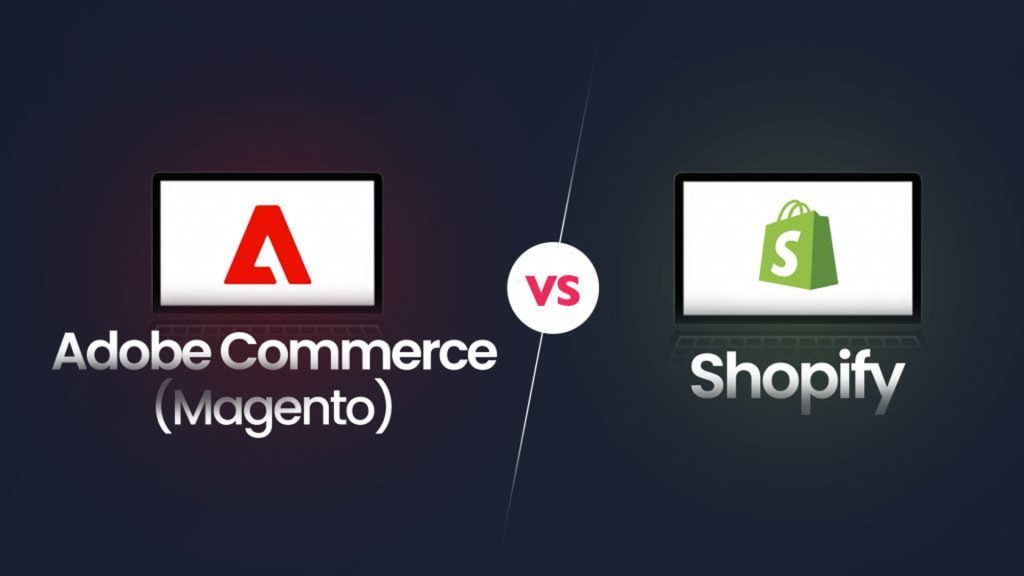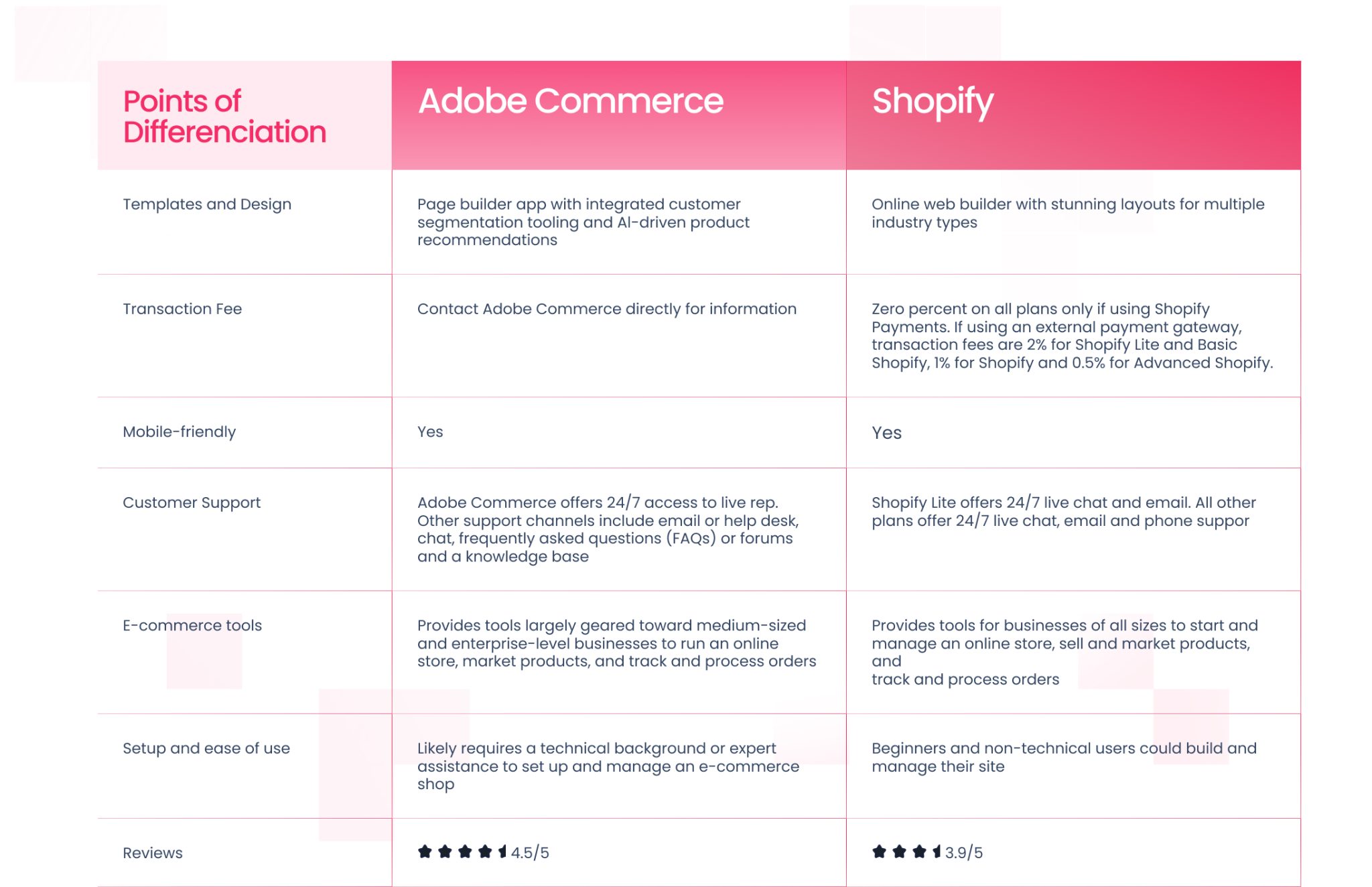Shopify Vs Adobe Commerce: Which is the best in 2025
- Dec 30, 2024
- By Tarun

Several ecommerce platforms make it possible for any entrepreneur to start an online business, sell their products, and manage orders. Among the popular platforms, Magento (Adobe Commerce) and Shopify top the list.
The two solutions serve thousands of merchants globally. They allow retailers to personalize their online storefronts, deliver seamless brand experiences, and optimize their corporate processes. However, one can be better suited than the other depending on your demands.
Here is a comparison between Magento (Adobe Commerce) and Shopify so that you can decide which is the best platform for your online business.
Overview of Ecommerce Platforms
With the constantly changing landscape of ecommerce, selecting the right platform has become critical in deciding the success of your business. These platforms provide businesses with all the necessary tools to create a solid online presence and manage and enhance their digital storefronts.
Shopify and Adobe Commerce, these are two of the largest brands. They are not mere players; they are creators of online success by providing a robust infrastructure for a business to create, hone, and expand its digital empires.
In this fast-paced digital era, let’s explore the unique strengths and nuances that differentiate Shopify and Adobe Commerce from the crowded field of boosting ecommerce ROI solutions. For businesses looking for expert consultancy, collaborating with a specialized Shopify agency will provide the best solutions and strategies to maximize the success of an online platform.
Shopify: The interface is very user-friendly, easy to use. This is the fundamental reason why businesses are setting up online stores without any technical knowledge. Shopify provides numerous customizable templates and apps according to the different needs of the business. The scalable integration with payment processing makes it ideal for small to medium-sized businesses with rapid growth requirements.
Adobe Commerce: Formerly Magento, Adobe Commerce is known for being an ultra-powerful yet flexible platform for large enterprises that have complex needs. It offers extensive degrees of customization, sophisticated SEO, and solid analytics. This solution can handle big inventories; it supports multiple languages and currencies, hence making it perfect for global entities.
Want to know more about them? Let us walk you through their features and benefits in detail!
Do you want to learn all about how to start an eCommerce business in the UK?
Shopify: What is it?
Shopify, the ecommerce powerhouse, is tailor-made for businesses of all sizes. Its user-friendly interface simplifies online venture initiation, while an all-in-one solution integrates essential functions like website design, payment processing, and order fulfilment. Versatile and adaptive, Shopify suits various industries and provides a rich app ecosystem for customization.
Key to its appeal are robust security measures that ensure safe transactions and data protection. Shopify’s reliability is a foundation for business confidence. Constantly innovating, the platform stays ahead with regular updates, offering a dynamic ecosystem for entrepreneurs to thrive.
Shopify is more than just an ecommerce platform. Instead, it is the catalyst for propelling online businesses into success. Whether an independent operator or a larger organization, it smooths out the complex facets of ecommerce and, therefore, proves to be the answer to competitiveness within the digital sphere.
Adobe Commerce: What is it?
Adobe Commerce, previously Magento, is a giant in the world of open-source ecommerce platforms, especially for large enterprises. It is known for unmatched customization capabilities and flexibility and provides a strong solution for companies looking to navigate the complex digital marketplace.
Being open-source, Adobe Commerce allows enterprises to configure the platform according to their unique needs, providing a degree of control and adaptability unmatched in the ecommerce space.
Its architecture is built considering scalability; thus, this is excellent in fitting into evolving needs as an enterprise is growing. Adobe Commerce comes packed with sophisticated feature sets far ahead of basic necessities such as inventory management, customer segmenting, and tailored marketing strategies.
Another is Adobe Commerce’s rich ecosystem of extensions and integrations that allows businesses to improve functionality in their ecommerce site and then create a customized solution to best fit their needs.
Adobe Commerce, with professional-grade security measures and dedicated support services, ensures that enterprises can handle large volumes of transactions and customer data while optimizing their ecommerce operations for success in the competitive digital landscape.
Want to choose the perfect ecommerce platform for your business? Here is a checklist to help you.
Ecommerce Platforms: Shopify vs. Adobe Commerce

In the highly dynamic world of ecommerce, choosing the right platform is all-important when it comes to business success. Let’s make a proper comparison between Shopify and Adobe Commerce (former Magento).
| Category | Shopify | Adobe Commerce |
| Pricing and Plans | Tiered Pricing Structure: Basic: $39/month, Shopify: $105/month, Advanced: $399/month (US). Additional Costs: Transaction fees, app costs, discounts for annual payments. Scalable Plans: Upgradable as business grows. | Custom Pricing: Tailored for larger enterprises with complex needs. Flexibility: Negotiation and customization based on business needs. |
| Ecommerce Functionality | Seamless Integration: Several different payment gateways. Built-in Features: Recover abandoned carts, discount code usage, rich app store. User-Friendly: Easy interface for product management and order fulfilment. | Advanced Management: Strong inventory and product catalogue management. Customization: Custom checkout and extended order management. Complex Operations: Suitable for large enterprises. |
| Templates and Website Editor | Extensive Library: Wide variety of professionally designed templates. Ease of Customization: Drag-and-drop editor, mobile-responsive themes. Advanced Customization: HTML/CSS editing. | Scalable Infrastructure: Handles high volumes of traffic, and supports multichannel selling. Automatic Scaling: Performance optimization out-of-the-box. |
| Scalability | Variety of Themes: Responsive designs are updated regularly. Customization: Preview and edit themes before installing. | Enterprise-Level Scalability: Supports high transaction volumes, multiple storefronts. Customizable Infrastructure: Adapts to growth and changing needs. |
| Themes | Comprehensive Platform: Steeper learning curve due to advanced features. Technical Expertise Needed: Requires customization and configuration. Dedicated Support: Extensive documentation, and resources. | Premium Themes: Advanced functionality, extended design options. Theme Marketplace: A great variety of different needs. |
| Ease of Use | User-Friendly Dashboard: Easy setup and management, minimal technical expertise. Support: 24/7 customer support, extensive resources. | Dedicated Support: Personalized assistance, certified developers. Comprehensive Documentation: Extensive user guides and knowledge base. |
| Help and Support | 24/7 Support: Live chat, email, phone. Rich Resources: Tutorials, community forums, and regular updates. | Dedicated Support: Personalized assistance, certified developers. Comprehensive Documentation: Extensive user guides, knowledge base. |
Pricing and Plans
Shopify:
- Tiered Pricing Structure: Shopify has plans to fit every size business. The Basic plan starts at $29 per month for 1 year, the Shopify plan starts at $79 per month for 1 year, and the Advanced plan is $299 per month for 1 year in the US (PageFly) (Ecommerce Platforms).
- Scalable Plans: Allows businesses to upgrade as they grow, providing access to more advanced features
- Additional Costs: Transaction fees are included, along with the app’s cost, but discounts can be applied for yearly payments.
Adobe Commerce:
- Custom Pricing: This one target huge enterprises, with their huge needs, so it is quite adjustable. With such an option comes additional fees for extra support and adjustment.
- Flexibility: Negotiation is possible to a certain extent, and flexibility concerning customization according to specific needs.
Verdict: Choose Shopify for its scalable pricing options that suit businesses of all sizes. Go with Adobe Commerce if your business needs the level of customization and enterprise-level features it offers, despite the potentially higher costs.
Ecommerce Functionality
Shopify:
- Seamless Integration: integrates with any payment gateway for smoother transactions.
- Built-in Features: features including abandoned cart recovery and discount code, a robust app store for more feature extensions
- User-friendly: Makes product management easy, in addition to a simplified way of fulfilling orders using.
Adobe Commerce:
- Advanced Management: Inventory and product catalogue management are strong.
- Customization: Customizable checkout process and highly advanced order management features.
- Complex Operations: This is for handling big operations and complex business requirements.
Verdict: Shopify is preferable for those businesses with small to medium sizes, given its simple user interface and hassle-free launching process. Adobe Commerce for large enterprises with all functionality options.
Templates and Website Editor
Shopify:
- Comprehensive Template Library: Offers a very large library of professionally designed templates.
- Ease of customization: Drag-and-drop editor with mobile-responsive themes.
- Advanced Customization: Ability to edit HTML/CSS for further customization.
Adobe Commerce:
- Highly Customizable Themes: it provides options for designing unique storefronts in a wide range of possibilities.
- Advanced Tools: Precise control over layout, typography, and branding.
- Third-party integration: Adds functionality to the website.
Verdict: Custom options in design combined with the flexibility offered by Adobe Commerce. Shopify would be chosen with its intuitive editor and excellent template library, so getting a site up and running very quickly and easily
Scalability
Shopify:
- Scalable Infrastructure: Supports massive traffic volume and multi-channel selling
- Automatic Scaling: Built-in feature to improve performance.
Adobe Commerce:
- Enterprise-Level Scalability: Supports millions of transactions and multiple stores.
- Infrastructure that is customizable: Compensates for growth and ever-changing business needs.
Verdict: Shopify shall be chosen for seamless scalability with business growth. Adobe Commerce should be chosen for enterprise-level scalabilities in case of a large-scale business operation.
Themes
Shopify:
- Customization Options: Ability to preview and edit themes before installation.
- Diverse Themes: Regularly updated and responsive designs.
Adobe Commerce:
- Premium Themes: Advanced feature set and comprehensive design options.
- Theme Marketplace: Diverse choice according to business requirements.
Verdict: Select Shopify because of its massive theme library and user-friendly customization process. Pick Adobe Commerce for its robust customization ability and premium themes.
Ease of Use
Shopify:
- User-Friendly Dashboard: It can easily be set up and managed without technical knowledge.
- Support: 24/7 with sufficient help at hand in case anyone is needed.
Adobe Commerce:
- Technical Knowledge Required: To do customizing and configuring
- Dedicated Support: There is abundant documentation and assistance.
Verdict: Shopify, for beginners, with an easy-to-use interface. Adobe Commerce is preferred when a business has in-house technical know-how and strict customization requirements.
Other Considerations
SEO Features
Shopify: It includes native SEO features, including editable meta tags, customizable URL structures, and integration with apps to enhance further optimization. Businesses focusing on search visibility will also benefit from using Shopify’s SEO options with add-ons such as SEO Manager.
Adobe Commerce: It shines in flexibility, thus having an open structure for deep custom modifications for SEO, tailored sitemaps, and advanced SEO strategies for reaching the world.
Need SEO guidance and support to boost your website rankings?
Looking for more? We Can Help!
Mobile Commerce
Shopify: Has a specific mobile application to manage your store on the go, ensuring you can take care of orders and track performance at any time.
Adobe Commerce: Though its themes are mobile-responsive, businesses might need extra extensions for better mobile functionality.
Future Updates
Both platforms are continuously evolving:
- Shopify is incorporating AI-driven tools and expanded payment options.
- Adobe Commerce is investing in advanced AI and machine learning for personalized shopping experiences and streamlined operations.
Summary
Choosing one of them may depend on your business goal, but Shopify and Adobe Commerce are two of the major ecommerce solutions. Shopify can be ideal for large business requirements, where a seamlessly scalable solution is required that has simple prices. Larger corporate entities will find suitable recommendations for extensive customization toward making complex and advanced features accessible. Decision-making would again depend on which suits the budget and respective requirements of the concerned business.
Shopify vs Magento (Adobe Commerce): Summary
In the ecommerce B2B battlefields, two giants stand out as serious players: Adobe Commerce formerly known as Magento and Shopify, with strengths that are different but complementary to each other and every business need. Here’s a summary of this head-to-head battle.

Adobe Commerce (Magento):
Famed for its open-source flexibility and a robust capacity for customization, Adobe Commerce is the big gun used in large enterprises that require powerful solutions for ecommerce ROI. Because of its scalability, its extensive array of features, and capabilities for extreme customization, the enterprise-level ecommerce business can ride through the complexities of any operation. From comprehensive catalogue management for products to flexible checkout processes, Adobe Commerce has it all in an all-encompassing solution for the enterprise-level needs of ecommerce.
Shopify:
Contrasting to this is Shopify, the very example of user friendliness and flexibility that allows even a small business and big enterprise with a highly intuitive interface and one-in-all solution to flourish. Ideal for all beginners and small to medium-sized businesses, Shopify can easily provide seamless settings, a plethora of rich professionally designed themes, and an immense ecosystem of apps that could extend functionalities of ecommerce. Shopify quotes are scalable and allow for a wide range customer service support, making Shopify a reliable platform for business ventures getting started with ecommerce.
Want to develop a business store? Contact us today.
Conclusion
The choice between Adobe Commerce and Shopify hinges on the specific needs and goals of your business. But if you are a big enterprise requiring a lot of customization and scalability, then go for Adobe Commerce. On the other hand, Shopify is the best if you need something easy to use, quick to set up, and versatile. Businesses in London can seek out a Shopify agency in London to get specialized support and insights tailored to local market dynamics.
Both Adobe Commerce and Shopify are driving forces in the ecommerce landscape, empowering businesses like RVS Media to thrive and succeed in the competitive digital arena. Whether you’re a small startup or a large enterprise, these platforms offer the tools and features needed for RVS Media to build and grow a successful online presence.
 Shopify
Shopify

















